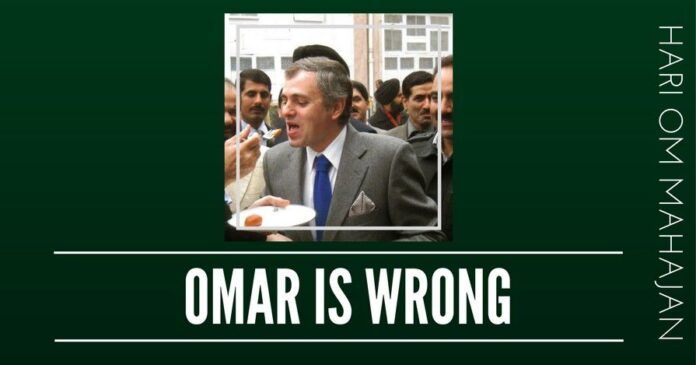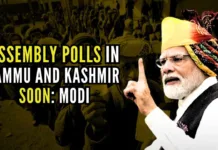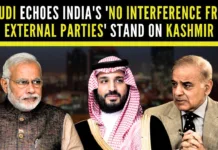
This story first appeared in early TIMES.
Out-on-a-limb Kashmir-based National Conference’s working president and Leader of Opposition in the Jammu & Kashmir Legislative Assembly, Omar Abdullah, is making mischievous statements calculated to mislead the people of India. For example, he is saying that Jammu & Kashmir is not the only state in the country which enjoys special status and that there are many other states, which like Jammu & Kashmir, enjoy special status.
It was the Indian Parliament that adopted Article 370 in October 1949 as a “temporary provision” and it can amend or revoke it if it so likes, as it is within its right.
On August 25, questioning the Bharatiya Janata Party (BJP)-led Government in New Delhi, Omar Abdullah said: “It (special status) is not specific to Jammu & Kashmir as many other states too have unique laws and people who are today talking about one India need to be asked to remove all these laws in these states first”.
Clearly, Omar Abdullah invoked Article 371 of the Indian Constitution to defend the special status Jammu & Kashmir enjoys within the Indian Union under Article 370, a temporary provision. Earlier, he had said that “Article 370 could be abrogated only over their (read Kashmiri Muslim) dead bodies”.
Omar Abdullah advances two frivolous and untenable arguments to defend Article 370 or the special status of Jammu & Kashmir. He says that the Indian Parliament “cannot” amend or revoke Article 370. And, then he puts forth an obnoxious argument that there existed no constituent assembly in Jammu & Kashmir and, hence, the question of repealing Article 370 does not arise at all.
Both the arguments hold no ground. The Parliament is the highest law-making body. It was the Indian Parliament that adopted Article 370 in October 1949 as a “temporary provision” and it can amend or revoke it if it so likes, as it is within its right.
It would not be out of place to quote verbatim what former Prime Minister Jawaharlal Nehru said on 27 November 1963 and what the then Union Home Minister Gulzari Lal Nanda said on 4 December 1964 in the Lok Sabha with regard to Article 370.
Jawaharlal Nehru said: “Article 370 has been eroded, the process of gradual erosion is going on, we should allow it to go on”. Gulzari Lal Nanda said: “Article 370 was a tunnel through which a good deal of traffic has already passed (read the extension of Central laws) and more will… while the normal process of (Constitutional) amendment is subject to stringent conditions, the process of amendment is very simple – by a Presidential order – a mere executive order”. To be more exact, Nanda said that the President of India using powers vested in him under Article 370 can amend or revoke it.
Article 370 can be repealed anytime through a mere executive order without taking the issue to Parliament. Nanda was absolutely right, as he only hinted at the constitutional position.
As far as the second argument is concerned, less said the better. Suffice to say that the constituent assembly is never a permanent institution; it is constituted to frame a constitution and once the constitution so framed is adopted and enforced, the constituent assembly ceases to exist or becomes dysfunctional. This was true of the Indian constituent assembly and it was true of the Jammu and Kashmir constituent assembly as well. The Jammu and Kashmir constituent assembly adopted the state Constitution in 1956 and was enforced on 26 January 1957. Those in Jammu and Kashmir who said that Article 370 cannot be amended or repealed as there exists no constituent assembly in the state only ridicule themselves. It is hardly necessary to reflect more on this point.
Omar Abdullah not only exposes himself by questioning the sovereign authority of Parliament, but he also exposes his intellectual bankruptcy by equating Article 370 with Article 371.
“Even in various parts of the country, Constitutional guarantees are provided under Article 371… people should not get misled by the elements inimical to peace and tranquillity of the state. The BJP is a divisive party which believes in creating a wedge between various sections of the population rather than binding them together,” Abdullah says.
There is no comparison between the Article 370 and the Article 371. Article 371, unlike Article 370, doesn’t empower any of the states to enjoy a special status within the Union and exercise residuary powers. Nor does it empower any of the states to have a separate constitution and a separate flag.
Article 371 only empowers the President of India to set up separate development boards for Vidarbha and Marathwada (Maharashtra) and Saurashtra and Kutch (Gujarat). The Article 371-A protects the “religious or social practices of the Nagas” and their “customary laws” and empowers the Nagaland Assembly to adopt or not to adopt the Central laws concerning “ownership and transfer of land and its resources”. It also gives “special responsibility” to the Governor of Nagaland “with respect to law and order in the State of Nagaland”.
Article 371-B provides for the Constitution and functions of a committee of the legislative assembly of the state (of Assam) consisting of members of that assembly elected from the tribal areas and for a similar committee in respect of Manipur comprising members of the assembly elected from the areas of the state.
Article 371-C requires the Governor to write a report to the President regarding the administration of the areas of Manipur. Article 371-D empowers the President of India to provide for equitable opportunities and facilities for the people belonging to different parts of the state (of Andhra Pradesh).
Article 371-E empowers the Parliament to establish a university in Andhra Pradesh.
Article 371-F authorizes the Parliament to protect the rights and interests of different sections of the population in Sikkim by creating or earmarking certain Assembly seats for candidates belonging to such sections. It also states the Governor of Sikkim shall have special responsibility for peace and for an equitable arrangement for ensuring the social and economic advancement of different sections of the population of Sikkim.
Article 371-G states no Act of Parliament in respect of religious or social practices of the Mizos, Mizo customary laws and practices, administration of civil and criminal justice involving decisions according to Mizo customary laws and ownership and transfer of land shall apply to Mizoram unless the legislative assembly of the state by a resolution so decides…”
Article 371-H gives special responsibility to the Governor with respect to law and order in the state of Arunachal Pradesh and in the discharge of his functions in relation thereto, the “Governor shall, after consulting the council of ministers, exercises his individual judgment as to the action to be taken…”
Article 371-I states “notwithstanding anything in this (Indian) Constitution, the legislative assembly of the state shall consist of not less than thirty members”.
So, Article 371, unlike Article 370, is beneficial for the ignored sections of society and ignored and underdeveloped regions. It empowers the Governors in certain states to exercise special powers and responsibilities and act according to their individual judgment. In fact, Article 370 promotes fissiparous tendencies and Article 371 empowers the people.
Time has finally come to call the Omar Abdullah’s bluff and work for the abrogation of Article 370 that has armed the ruling elite in the valley with absolute and unbridled legislative and executive powers and enabled it to create a wall of hatred between the Kashmiri Muslims and New Delhi and deprived the people of the state of normal civil and political rights. But more than that Article 370 has created an impression the world over that the issue of Jammu and Kashmir is still to be settled. Not only Article 370, Article 35-A also has to go lock, stock and barrel as it was applied to Jammu & Kashmir without taking the Parliament into confidence. It is a fraud committed by Nehru on the Indian nation to facilitate the rise of an Islamic state on the territories of India.
- ‘Kashmir My core constituency’: Revisiting July 12, 2003 to understand politics, Omar Abdullah-style - March 15, 2024
- Total deviation from traditional approach: Seven takeaways from PM Modi’s March 7 Srinagar visit - March 9, 2024
- Status of political parties: Why is further J&K reorganization imperative? - March 1, 2024











Remove Artcle 371 also why hold on to it.